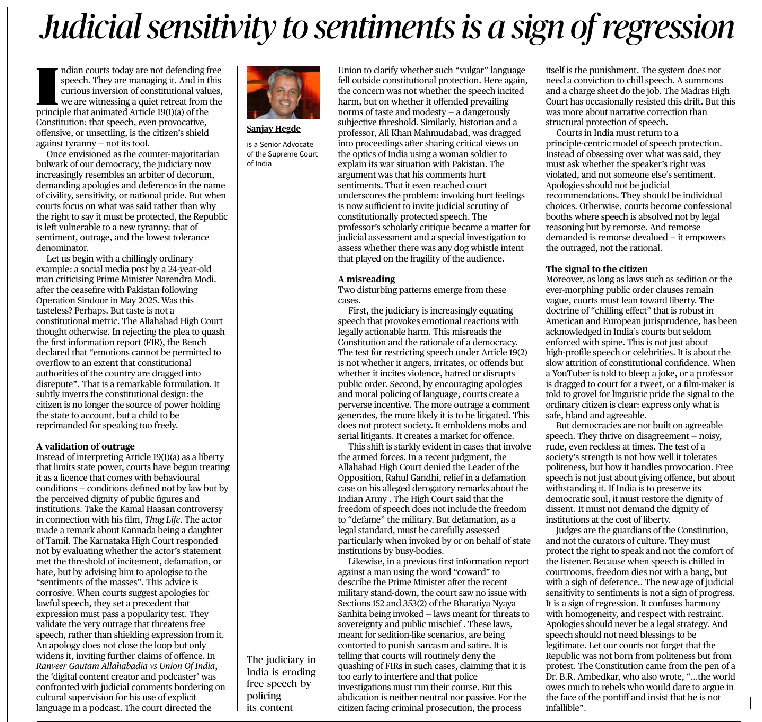1. Core Argument of the Editorial
- Indian judiciary is retreating from its role as a defender of free speech.
- Increasingly, courts are validating outrage and sentiment over constitutional principles.
- This shift marks a regression in democratic values and threatens liberty and dissent.
2. Constitutional Position on Free Speech
- Article 19(1)(a): Guarantees freedom of speech and expression.
- Article 19(2): Provides for reasonable restrictions, but courts are now stretching this to accommodate subjective sentiments.
- Earlier: Free speech was the shield against tyranny.
- Now: Speech is evaluated based on its potential to offend or “hurt sentiments.”
3. Key Cases and Examples Highlighted
a. Operation Shinar Incident (May 2023)
- A 24-year-old arrested for a post on PM Modi.
- Allahabad HC said “sentiments cannot be permitted to override constitutional rights.”
b. Kamal Haasan–Kichcha Sudeep Controversy
- Actor told to apologize for hurting Tamil sentiments.
- Karnataka HC upheld need to apologize to the “sentiments”, not legality.
c. Ashim Malamudabad Incident
- Professor critiqued India-Pakistan politics.
- University acted based on student outrage, not on constitutional assessment.
d. Rahul Gandhi Defamation Case
- Conviction upheld on questionable grounds.
- Reflects the judiciary’s tendency to uphold emotions over legal merit.
4. Major Issues Raised
a. Judiciary’s Misreading of Article 19(2)
- Focuses on outrage and offence, not on whether speech actually incites violence.
- Courts are becoming moral arbiters rather than constitutional protectors.
b. Impact on Dissent and Public Discourse
- Individuals now self-censor out of fear.
- Judicial endorsement of sensitivity leads to stifling of public opinion, humour, satire, criticism.
c. Outrage Culture Empowered
- Courts demand apologies/remorse instead of legal scrutiny.
- Sentiment becomes the standard, not the Constitution.
5. Philosophical and Legal Concerns
- “Chilling Effect”: Over-criminalisation of speech creates fear.
- Test of free speech is how society tolerates discomfort, not how it rewards politeness.
- Courts need to uphold reasoned liberty over emotional reactivity.
6. Signal to the Citizen
- The growing judicial deference to sentiments:
- Encourages moral policing.
- Delegitimises dissent and criticism.
- Sends the wrong signal — that expression must please, not provoke.
- Encourages moral policing.
7. Call for Judicial Recalibration
- Judiciary must return to its primary constitutional role:
- Defend the right to offend, not manage outrage.
- Separate individual choice from public pressure.
- Assess constitutional legality, not emotional damage.
- Defend the right to offend, not manage outrage.
- Conclusion
- Remorse and outrage should not override legality.
- Courts must resist becoming instruments of populist moralism.
India needs a judiciary that upholds reasoned liberty, not just regulated speech.


